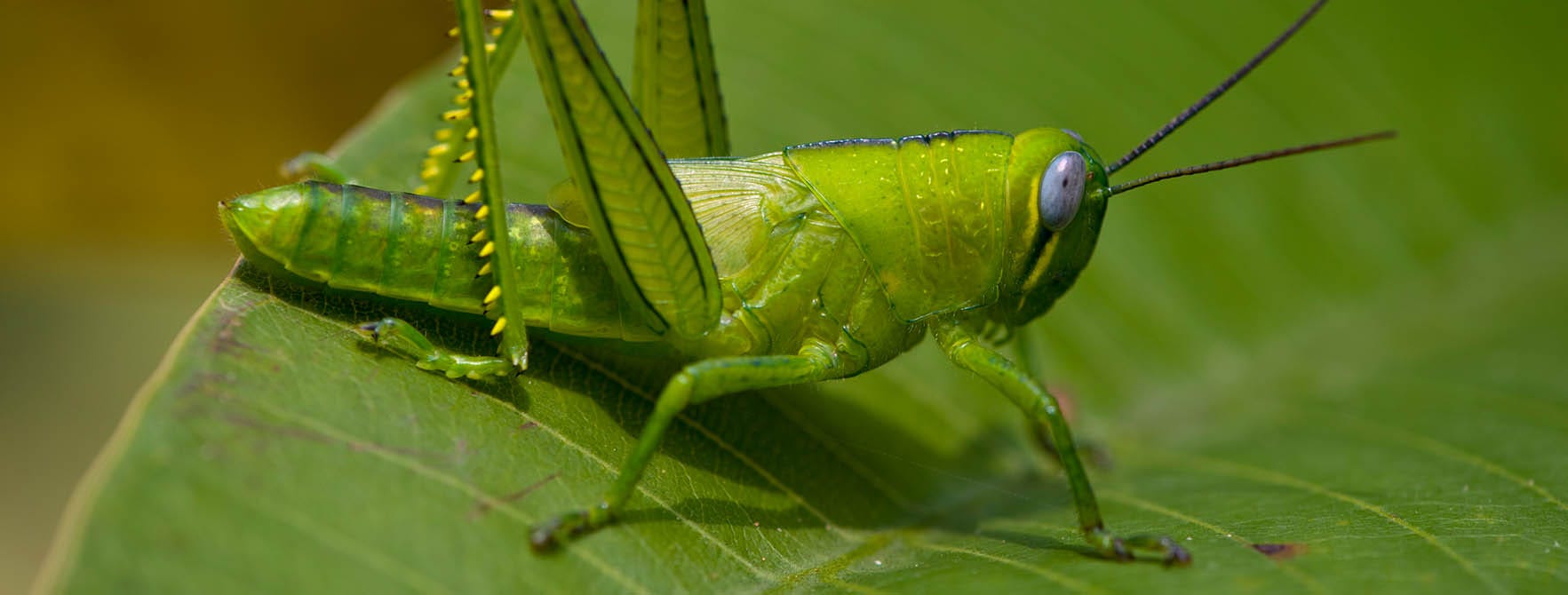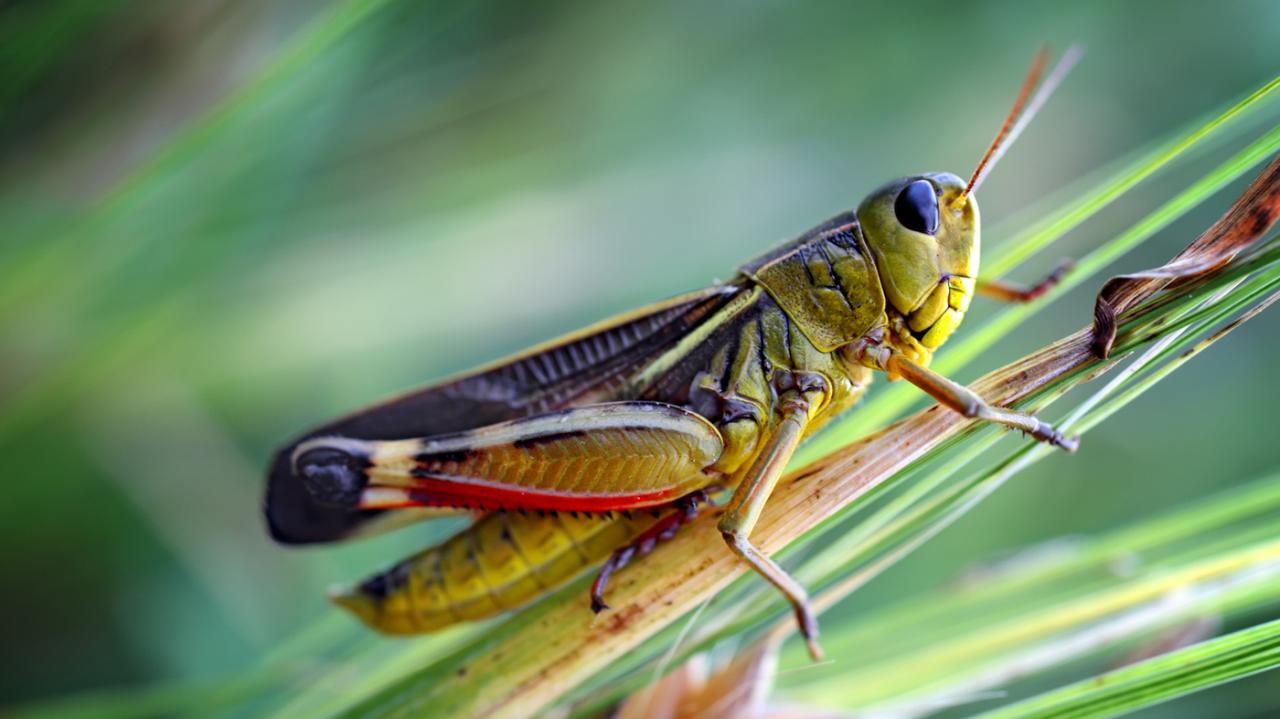When you take your cats for a stroll in the garden, you might be surprised and bewildered at the same time to see them bouncing, jumping, and playing with the insects that keep flying within their reach. Just when you think that your cat is having a gala time playing with these insects and bugs, it may just casually consume them, much to your utter shock!
As an affectionate cat parent, it is quite natural for you to be worried if your cat just swallows a grasshopper right before your eyes. If you have been wondering if cats can eat insects like grasshoppers, this article is right where you have to be. Here, we will tell you all you need to know about the relationship between these insects and your beloved felines.
Before getting into the details, here is our short answer to your question. Yes, cats can eat grasshoppers, as long as those are not brightly-colored ones. A couple of grasshoppers here and there should be a problem for cats, as they are obligate carnivores by nature.
Cats and the art of chasing & playing
In their natural habitat, cats are used to chasing their prey and hunting it down. So, domesticated cats exhibit the same tendencies. When taking a walk in the garden, they are inclined to chase an insect within their reach. More than eating the insect, the real fun for cats is running behind it, and chasing it down.
In the bargain, if your cats eat one or two grasshoppers, you shouldn’t mind, because these insects don’t pose any health risks or threats to felines. However, please remember that you can only allow your cats to eat the normal green or brown-colored grasshoppers. The brightly-colored ones may look extremely attractive, but they can cause havoc on the sensitive digestive system of cats if you are not careful enough.
Health risks associated with grasshoppers

According to experts, grasshoppers are harmless, and you can rest assured knowing that they cannot make cats extremely sick. However, when cats have too many grasshoppers than they ought to, the exoskeletons of the insects can cause them slight discomfort in their mouth. Overconsumption of grasshoppers can also lead to gastrointestinal issues in cats. The good thing is that cats learn their lessons very quickly.
When they experience any discomfort by eating grasshoppers, they never attempt to catch these insects again. So, you may notice that cats falling sick due to grasshoppers is usually a one-time occurrence. In very rare cases, the parasites in grasshoppers can transfer inside cats, causing some serious damage to their internal organs. However, please don’t panic; this is a very rare issue in domesticated cats.
Keep your cats safe from insects like fleas and ticks, as they are far more harmful to felines than grasshoppers.
Can grasshoppers cause fatalities in cats?
No, as we already told you, grasshoppers don’t cause any harm to cats. No deaths have been reported so far in cats, due to the consumption of grasshoppers. Cats are attracted to these insects, as they are naturally predatory. The act of chasing and running behind their prey gives a kick to cats, which is the only reason they hunt grasshoppers, and eat them in the process.
Mouth irritations and stomach upsets are the only common issues that your cats may experience (yes, not all cats get sick from eating grasshoppers) if they eat these insects. However, these are minor issues, which your cat will easily recover from.
What happens when cats eat grasshoppers?

Has your cat eaten a few grasshoppers, while you took it out for a stroll? Never mind; keep watching your pet for some abnormal reactions. Some of the symptoms you can expect in your cat after eating grasshoppers are:
- Gastrointestinal issues, diarrhea, irritable bowel syndrome, and other stomach-related problems – these problems will subside in a couple of days, and your cat should be back to normalcy soon
- Allergic reactions or anaphylaxis – this happens when the grasshopper stings or bites your cats; can be treated easily by the vet
- Internal parasites in grasshoppers – this happens if the grasshoppers they consume have parasites; however, this issue is very rare
- Stomach discomfort due to insecticides – sometimes, cats can ingest the insecticides used in the garden to control insects, when they eat grasshoppers, causing slight abdominal discomfort
Can you feed grasshoppers to cats?
Well, this is quite a weird question, because not many cat parents would feed live grasshoppers to their felines, on purpose. However, you may be surprised to know the answer to this question. According to feline experts worldwide, it is okay to feed a few grasshoppers to cats once or twice a week, because these insects come with reasonable nutritional value for cats. If your cats cannot go outdoors and catch grasshoppers in the garden, you can feed them these insects, without any second thoughts.
To avoid choking issues, you can make a liquefied and blended meal of grasshoppers before feeding to cats. Why is it alright to feed them these insects? Grasshoppers come with some benefits for cats, like the following:
- Grasshoppers are good sources of proteins and amino acids, which help to strengthen the cat’s muscles and immunity system.
- These insects help to keep the cat’s coat shiny and healthy.
- As they have high water content, grasshoppers help in the overall healthy functioning of the cat’s urinary tract.
- Since grasshoppers are good sources of fiber, they help regulate the cholesterol levels in cats, thereby reducing their risk of heart diseases.
Final Word
As you can see, grasshoppers are harmless to cats and don’t pose any serious health risks. Additionally, these insects also have many benefits that cats can enjoy. However, it would help if you remembered that grasshoppers could not replace the full meal, as these insects don’t have the proper dietary requirements to satisfy felines. While it is okay for your cats to catch and eat a couple of grasshoppers once or twice a week, please ensure that you don’t compromise on their regular meals. Also, it is worthy of remembering that only the green and brown colored grasshoppers are harmless, not the brightly-colored ones.
